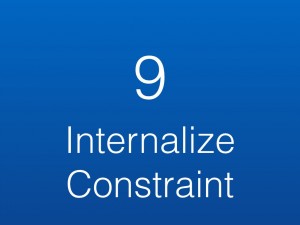Where possible, bring the constraint inside the organization (and lock it)
The Decalogue approach to management is based on process stability; indeed the most critically important part of the system is the constraint. Hence, we want to ensure maximum predictability especially on the constraint. Clearly, when the constraint is external such predictability is more difficult to achieve. This is the reason why, whenever possible, we want to manage an internal constraint. Moreover, this is also the easiest way to make the system grow without stirring company dynamics conducive to mayhem.
The need for constraint reliability is so strong that even when organizations have a virtually unlimited internal capacity, like supermarkets, we should always elect to appoint an internal constraint and subordinate the whole organization to it. The growth of the system will then happen through a systematic, orderly and relentless exploitation of the capacity of the constraint. When such a capacity is not sufficient to meet market demand we will first increase the appropriate non-constraint areas making them capable of subordinating to the constraint and only then we will elevate the constraint. One more time: the name of the game is process predictability.





